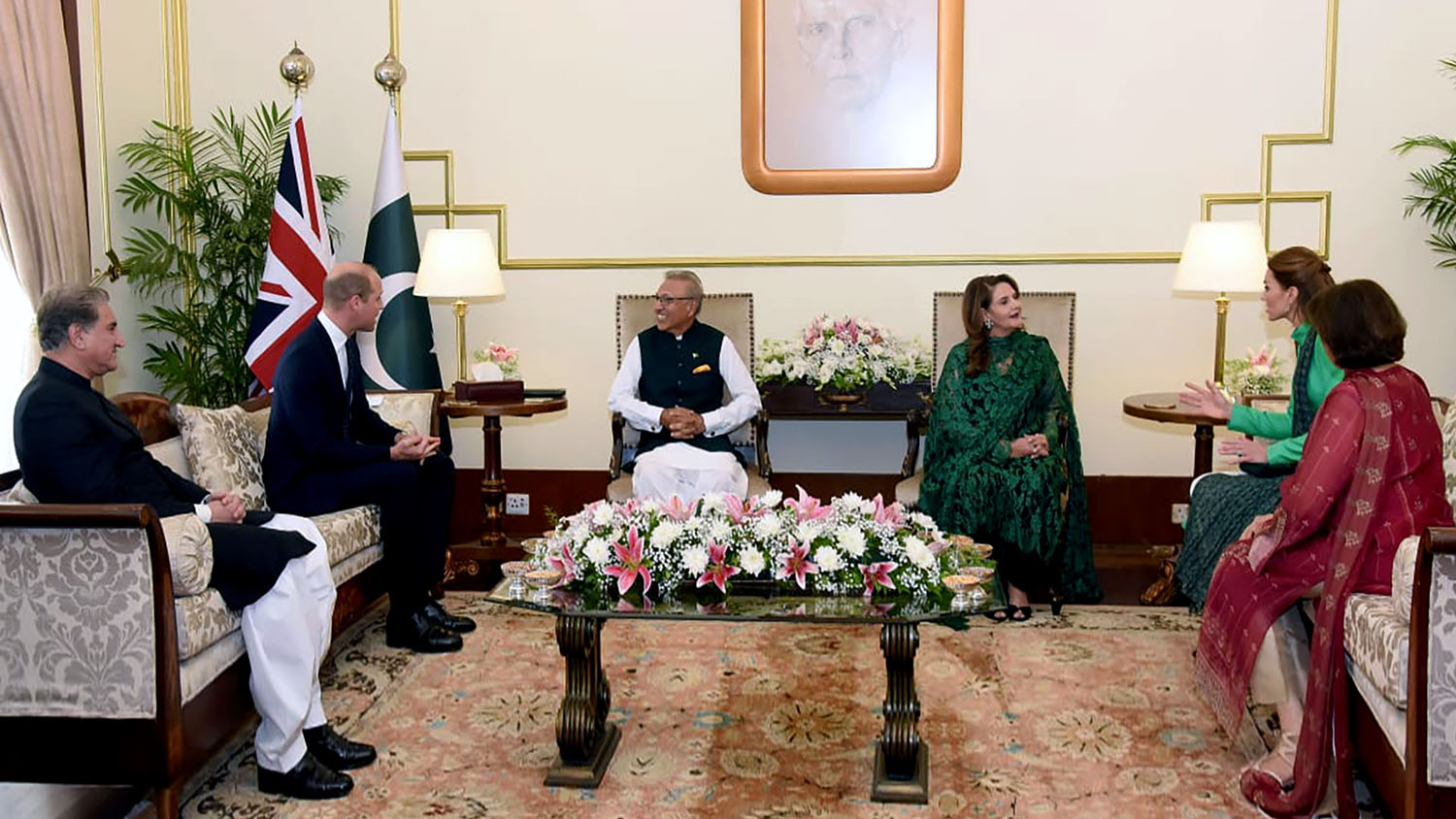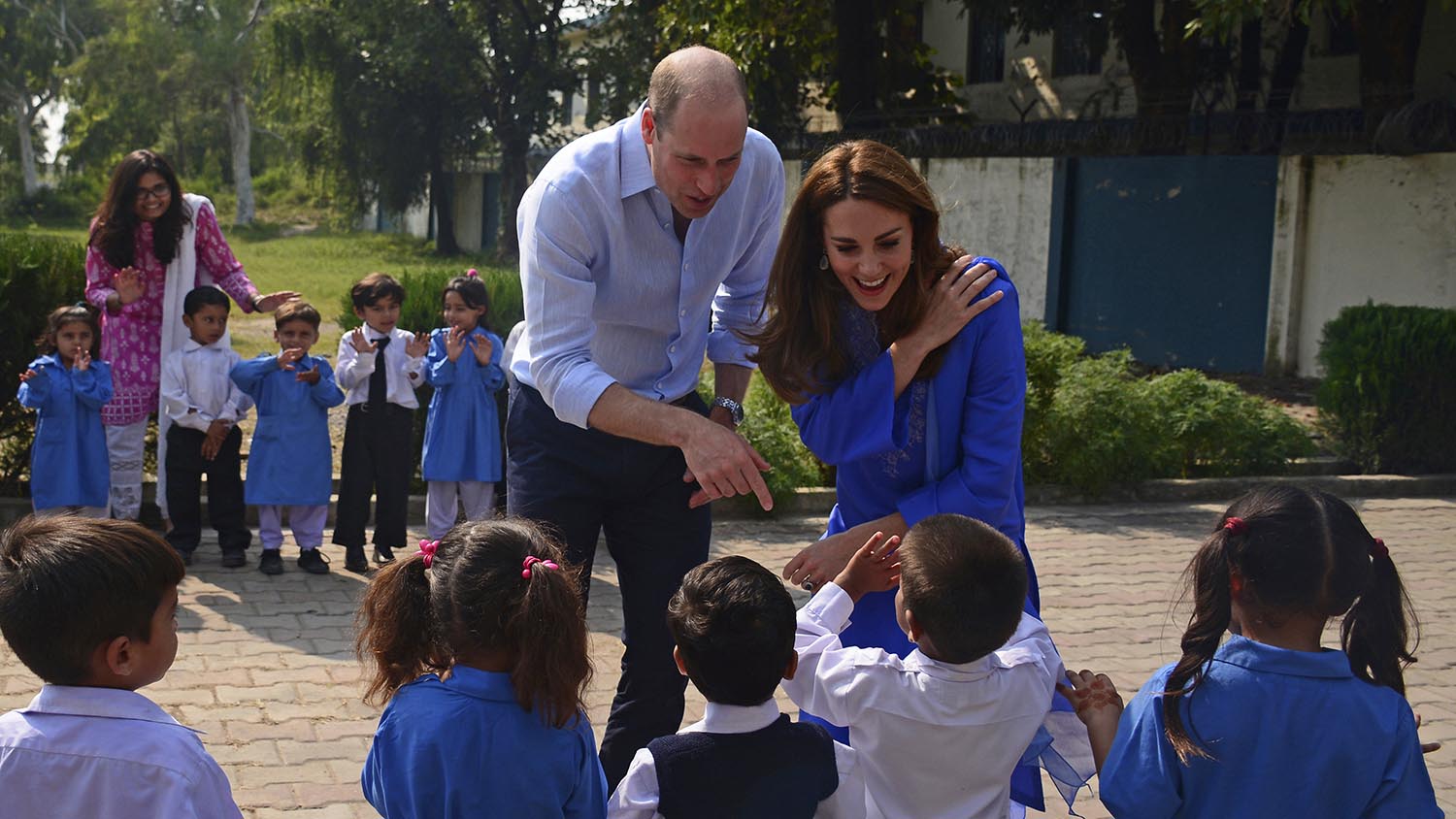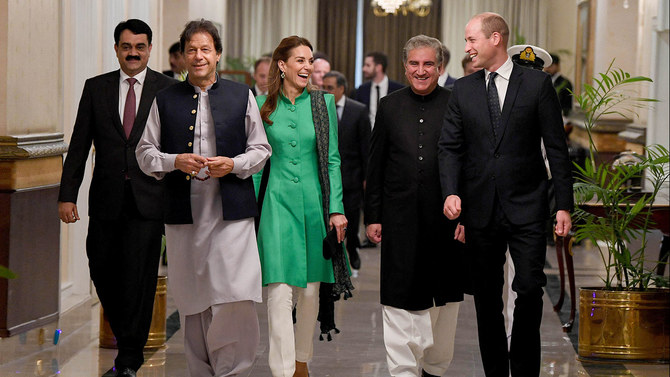ISLAMABAD: Britain’s Prince William and Kate Middleton on Tuesday met President Arif Alvi and Prime Minister Imran Khan at the outset of their five-day tour of Pakistan amid tight security.
Khan received the royal couple at the doorstep of his official residence in Islamabad shortly after they were greeted by President Alvi and his wife at the Presidency. The country’s foreign minister, Shah Mehmood Qureshi, and his wife were also in attendance.
“While welcoming the Royal couple, Prime Minister Imran Khan recalled the love and affection among the people of Pakistan for Princess Diana because of her compassion as well as commitment to support charitable causes,” read an official handout circulated by the PM House later in the day.
“The Prime Minister apprised the Royal couple of domestic priorities and Pakistan’s perspective on external environment, including relations with India post 5 August and support for peace and reconciliation in Afghanistan,” it continued.
In response, The Duke of Cambridge thanked the government for its warm welcome and hospitality and described Pakistan as “a very important country for the UK.”

In this photo released by the ruling Pakistan Tehreek-e-Insaf (PTI) party, visiting British royal couple, Prince William, second left, and his wife, Kate Middleton, second right, meet with Pakistan’s President Arif Alvi, center left, and his wife, Samina Alvi, in Islamabad on Oct. 15, 2019. (Photo courtesy: PTI)
The country’s ruling Pakistan Tehreek-e-Insaf (PTI) party also tweeted about the meetings with great pride, branding the British royal visit as “historic.”
“Pakistan has come out of international isolation due to engaging foreign policy under PTI Government,” the party said in one of its Twitter posts. “The current foreign policy to engage with all countries have enabled Royal couple to visit Pakistan on their maiden trip, this is first Royal trip since 2006.”
Firdous Ashiq Awan, Special Assistant to Prime Minister on Information and Broadcasting, also used the social media platform while expressing hope that the royal couple would take back good memories of Pakistan at the end of their visit.
She added that the visit was taking place only a few months after the British Airways resumed flights to Pakistan.
Earlier in the day, the royal couple also visited the government-run Islamabad Model College for Girls to “champion the importance of quality education, particularly for girls,” the British High Commission in Islamabad said in a statement.
They met pupils from kindergarten to sixth grade and saw how they were benefiting from Teach for Pakistan, a fast-track teacher training program modeled on the UK’s successful ‘Teach First’ scheme.
“49% of girls are out of school in Pakistan — The Duke and Duchess of Cambridge’s engagement at Islamabad Model College is championing the importance of quality education, and how girls benefit from pursuing higher education and professional careers,” Kensington Palace, the official twitter account of The Duke and Duchess of Cambridge, wrote.

Britain's Prince William and his wife Kate interact with students during their visit to a school outside Islamabad on Oct. 15, 2019. (AP)
Prince William and Kate Middleton also visited the Margalla Hills to participate in a number of activities which highlighted Pakistan’s work to meet several of the sustainable development goals.
They joined children from four local schools to set up a leopard camera trap. “Environmental change and its impact is an increasingly serious issue in Pakistan, a country especially vulnerable to climate change. The Margalla Hills in particular face threats of encroachment, poaching, wildfires, invasive species and littering,” the British High Commission said.
Discussing the visit of the royal couple with Arab News, foreign policy experts called it important one for the country.
Rasul Bakhsh Rais, who teaches at the Lahore University of Management Sciences, said: “The royal visit serves a symbolic purpose highlighting the historic ties between Britain and Pakistan as a member of the Commonwealth. In the present context, the aim is to promote Pakistan’s positive image as a safe and secure country that is connected with the rest of the world community.”
He added that images of the visit would be splashed around the world, greatly contributing to the country’s image building exercise.
“The visit has certainly helped project a positive image of Pakistan. The high-profile visit of the royal couple will help remove the perception about Pakistan as being a dangerous country,” author Zahid Hussain told Arab News.
The couple received a red carpet welcome on Monday night when their plane touched down at the Nur Khan Airbase in Rawalpindi, the garrison city adjacent to the country’s federal capital, Islamabad.
Pakistani authorities have deployed over 1,000 security personnel to ensure the royal couple’s protection.
Britain hopes the first royal visit to Pakistan in 13 years will further strengthen ties between two countries. “The UK’s links with Pakistan are extensive, and TRH (Their Royal Highnesses) are looking forward to building a lasting friendship with the people of Pakistan,” the British High Commission said in a statement.
The High Commission added that the royal couple would tour the country to see the dynamic, aspirational and modern Pakistan.
From the modern leafy capital Islamabad, to the vibrant city of Lahore, the mountainous countryside in the North, and the rugged border regions to the West, the visit will span over 1000km, and will take in Pakistan’s rich culture, its diverse communities, and its beautiful landscapes.

















